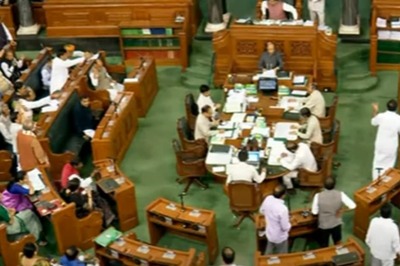
views
New Delhi: Nationalist Congress Party (NCP) chief Sharad Pawar’s nephew Ajit Pawar’s decision to join hands with the BJP to form the government in Maharashtra is constitutionally valid as long as there is no split within the party, constitutional expert and former Lok Sabha secretary general PDT Acharya told News18.
“The anti-defection law has a conditional applicability in this scenario. The main point of contention is whether Ajit has broken away from the NCP. If he has broken away from the party, then the law applies to them," he said.
“Whether junior Pawar has overstepped senior Pawar in terms of party ranks is beyond the purview of the Constitution. Here, senior Pawar has to move quickly and prove the split," he added.
The former Lok Sabha secretary general noted that the only way the BJP-Ajit Pawar government can escape the anti-defection law is by posing the NCP as a whole unit.
In the early hours of Saturday, the BJP-led government in Maharashtra joined hands with Ajit Pawar to form the government, a month after the election results were declared. Fadnavis returned to power as chief minister for a second term, while Ajit Pawar took oath as his deputy.
Following news of government formation, Sharad Pawar came out strongly against his nephew and said Ajit Pawar’s decision to support the BJP was a personal one, and not that of the NCP. “We place on record that we do not support or endorse this decision of his," Pawar said in a tweet, distancing himself from the coup.
Later on Saturday, the party removed Ajit Pawar as its legislature unit leader.
On the question of whether the anti-defection law would be applicable without having an Assembly in place, Acharya said, “As soon as the elections results are announced, the Election Commission of India notifies all the results. As and when that happens, the Assembly is automatically constituted."
The anti-defection law is applicable to sitting members of the Assembly. Under the law, a member may be disqualified if he/she voluntarily gives up the membership of the party. Voluntarily giving up membership is not the same as resigning under the gambit of this law.
However, there is an exception in this law providing that a member may not be disqualified if there is a merger between two political parties and two-thirds of the members of a legislature party agree to the merger.
For Ajit Pawar to avoid disqualification, he has to prove a two-thirds majority of 36 MLAs supporting him in this move.
The political drama unfolding in Maharashtra comes after the BJP and the Sena, which fought the state elections in alliance, secured a comfortable majority in the Assembly elections but refused to stake claim to form the government when invited by Governor BS Koshyari.
The BJP with 105 seats did not cede to the Sena's demand of sharing the chief minister's post, leading to falling apart of the nearly three-decade-old alliance. Sena had 56 seats in its tally. The Congress and NCP won 44 and 54 seats respectively, in the last month's polls.
The Sena, which tied up with the Congress and the NCP, has filed a petition in the Supreme Court against the government formation and seeking an urgent floor test. The petition has been listed for hearing at 11.30 am on Sunday.














Comments
0 comment